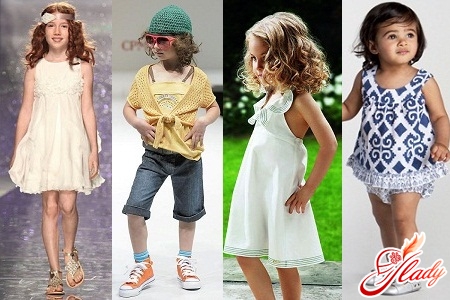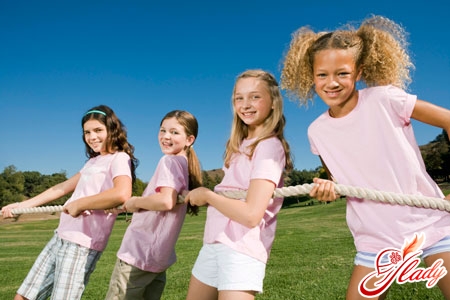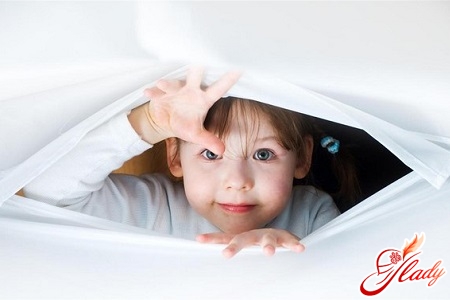 Children's fears - What is it and how to deal with it?fight them? As a rule, adults react to children's fears in very different ways. Some parents start to panic and immediately start giving their beloved child sedatives. Others simply do not pay any attention to the child's experiences, believing that over time it will pass on its own. Still others begin to scold and even punish the innocent child, believing that he invented all the fears in order to get certain concessions in discipline and additional privileges. And only a small part of parents makes the right decision and seeks qualified help from a child psychologist. But this is absolutely correct, because ignoring children's fears can significantly worsen the situation and lead to the emergence of such a formidable complication as childhood neurosis, which requires serious treatment, often in a hospital setting. Timely work of a psychologist with children's fears will help to eradicate the problem at the very beginning of its development. Even if neurosis was avoided, fears in a child, left unattended, can cause significant damage to the child's psyche. After all, many complexes and phobias inherent in adults originate in childhood.
Children's fears - What is it and how to deal with it?fight them? As a rule, adults react to children's fears in very different ways. Some parents start to panic and immediately start giving their beloved child sedatives. Others simply do not pay any attention to the child's experiences, believing that over time it will pass on its own. Still others begin to scold and even punish the innocent child, believing that he invented all the fears in order to get certain concessions in discipline and additional privileges. And only a small part of parents makes the right decision and seeks qualified help from a child psychologist. But this is absolutely correct, because ignoring children's fears can significantly worsen the situation and lead to the emergence of such a formidable complication as childhood neurosis, which requires serious treatment, often in a hospital setting. Timely work of a psychologist with children's fears will help to eradicate the problem at the very beginning of its development. Even if neurosis was avoided, fears in a child, left unattended, can cause significant damage to the child's psyche. After all, many complexes and phobias inherent in adults originate in childhood.
The essence of childish fear
What are childhood fears and what is their nature?origin? Fear is an emotional reaction of the psyche to the impact of threatening factors. However, as psychoanalysis of children's fears shows, their specificity is such that a real threat, as a rule, does not exist, and the emergence of the problem itself is due to a very rich and vivid children's imagination. The source of the child's imagination is his environment, in particular, adults who overly emotionally discuss the problems of fires, natural disasters, traffic accidents and other accidents in the presence of children. Children's night fears can be caused by watching horror films. Often it seems to us that the child is busy with his own affairs and does not pay any attention to what is happening on the screen. However, in fact, this impression is very deceptive - the baby, like a sponge, absorbs all the information. And since he is not always completely able to distinguish truth from fiction, this subsequently leads to the emergence of children's fears.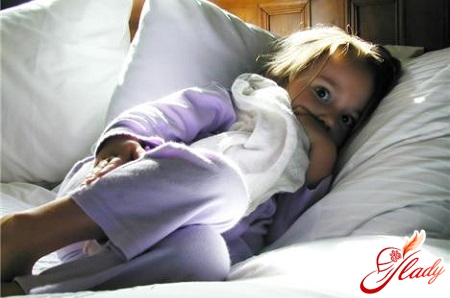
The causes of fears in children
There are also many differentprerequisites for the development of fears in children. The reasons for their occurrence are often hidden much deeper than it seems. Where adults do not even think to look for them. Psychologists name the main ones:
Diagnosis of childhood fears
An important part of the workA psychologist's work with children's fears is to diagnose them and establish the causes. As a rule, for child psychologists, diagnosing children's fears is not difficult. They are all very similar to each other. Each psychologist has his own method for identifying children's fears. But in general, in essence, they are all very similar and are based on the main typical features of the child's psyche. Absolutely any method for diagnosing children's fears aims to identify not only the types of psychological illness, but also the cause of its occurrence. Some specialists use drawing for this, others - modeling, and others prefer talking with the baby. It is difficult to name the best diagnostics of children's fears, since all these methods give equally effective results, and when choosing a method, it is necessary to take into account a number of individual psychological and age characteristics of each child. The classification of children's fears distinguishes two main types:
- A child's fear of punishment for somethingmisdemeanor Moreover, the mistake can be so insignificant that adults simply will not pay any attention to it. The presence of such fears indicates serious problems in the relationship between the child and parents, sometimes it can even be a consequence of excessively strict treatment of the baby. If such a fear appears, parents should seriously think about their model of behavior with the child and reconsider it in order to avoid serious problems.
- Fear of blood Many children, when they seea small drop of blood that appears from a scraped knee, they start screaming with such force that you might think that the wound is not a small scratch, but skin that has been removed alive, which, on top of everything else, is sprinkled with a pack of salt. In fact, the child is screaming not from pain, but from panic fear. This is a feeling that is absolutely beyond the child's control, so you shouldn't laugh at it. Fear of blood is most often caused by a banal ignorance of physiology - it seems to the child that all the blood will flow out and he will die. In fact, fear of blood is a derivative of the fear of death.
- The death of parents is also a fairly common type of childish fears, often born of the same adults.
As you can see for yourself, it is not always farthe fact that a child does not tell his parents about his fears means that they do not really exist. If parents deny the phenomenon of children's fears as such, and, accordingly, do not see the need to work with them, they can proceed without symptoms. However, in such a case, the negative consequences for the child's psyche will be many times more severe than if the parents recognized the problem and helped the child overcome childhood fears. However, those parents who themselves have a suspicious character and are overly impressionable can also aggravate the situation by creating unnecessary fuss around it, thereby concentrating and fixing the baby's attention on the existing problem. But working with children's fears consists precisely in identifying fears and making the child forget them, without focusing the child's attention on them. Sometimes there are even situations in which parents can involuntarily, at a subconscious level, project their own fears onto their children. This is, as a rule, the fear of the death of parents, which sooner or later any child experiences, the fear of punishment (most often found in men). As a rule, if parents manage to find their common fears with their children, overcoming them becomes much faster and easier.
Identify the causes of childhood fears
As already mentioned, in order to successfullyTo overcome a child's fears, it is necessary to use psychoanalysis to find out their causes. At home, you can use several simple methods for identifying children's fears that are accessible to parents and that give a very accurate idea of the nature of the problem:
- Drawing Even if your child is nothas special artistic talents, you can ask him to draw what worries him. However, the request should be in a very soft, tactful form and should in no way be of an imperative nature. Modeling from plasticine is suitable for those children who do not like to draw. The recommendations for parents in this case are absolutely identical.
- If the above method did not help to determinereasons for the emergence of childhood fears, you can suggest that the child come up with a fairy tale that will tell exactly about what worries the baby. As a rule, this method is ideal for determining children's fears after five years. Be sure to write the fairy tale down on paper. Firstly, in this way, fears are visualized, which is the task of absolutely any diagnostic method, and secondly, it can be useful to you in the future, in the event of a repeated occurrence of anxiety and fears in the child.
Another effective way of howto overcome fears in children, is to talk to the child about the topic that worries him. An adult who is going to talk to the child should approach this issue seriously and think over the list of questions that he will ask the child in advance. Also, make sure that all questions are asked at a level that is accessible to the child's understanding. Do not rush the child with an answer, you need to give him time to think. In no case should you focus on any one reason, as this can lead to the emergence of a new fear.
Classification of childhood fears by age
There are different classifications of childrenfears that are understandable only to psychologists, so there is no point in listing them all. However, below is the most complete list of common childhood fears, taking into account age characteristics, because this syndrome is different in different age categories. Childhood fears in children from 0 to 3 years old
- As strange as it may seem, childrenthe first year of life are also subject to childhood fears. For example, this could be a fear of a new environment. Surely, any mother has noticed how the baby changes as soon as he gets into an unfamiliar room.
- Also, children have a common fear of losingmom It is so widespread that it simply makes no sense to describe the problem. However, unfortunately, very often such fear is taken for spoiledness and whims of the child.
- At the age of one to three years, they appearnew childhood fears, in which the baby's parents become the unwitting culprits. For example, fear of the dark, when a child is frightened by the "bogeyman" and other mythical characters.
- There is also a child's fear of being left alone.at least for a minute As a rule, it arises precisely because the baby’s basic need for parents in the first year of life was considered by adults to be ordinary spoiling, and the child was deprived of constant close contact with the mother.
- Night fears. In most cases, they are a continuation of the fear of darkness. Remember that watching some modern cartoons can significantly exacerbate the situation.
Children's fears in children aged 3-5 years For the age category of three to five years, the most typical fears are:
- Panic fear of loneliness;
- Fear of darkness.
- Also at this age, some parentsthey are surprised to see that their crumbs have a fear of enclosed space, for example, a child may refuse to enter the elevator or start demanding that the door to the bedroom be left open. Psychocorrection of such childish fear is mandatory, otherwise this fear may emerge in adulthood, resulting in claustrophobia.
- Children's nighttime fear at this age is caused by fairy-tale characters, so the child at this age identifies them with quite real people.
Fears in children aged 5-7 years At the age of 5-7 yearssyndromes of childhood pathological fears become much more diverse. The child's horizons expand, and with them new fears may appear in the life of the little person.
- For example, night fears at age 7 acquirea new form - the child begins to be afraid to fall asleep, because in a dream he sees terrible dreams. And this is a very serious strain on the nervous system of the child, therefore correction of night fears of 7 years is simply obligatory.
- There is a fear of punishment. As already mentioned, this is a very disturbing signal that not everything is in order with the relations between parents and children. Psycho-correction of children's fears before punishment should begin with a change in the parents' approach to the process of raising a child. It has long been recognized that the physical effect on the baby does not bring anything but harm.
- Under the influence of conversations between adultsand watching TV shows, a child may develop an overwhelming fear of animals, most often dogs. By the way, adults often reinforce this fear by being overprotective of the child.
- At this age the child is faced with sucha sad phenomenon of human life, like death. However, to realize until the end of this child can not yet, and therefore the baby has a fear of his own death, the death of his parents.
- In addition, the fear of death in the child, as a consequence, entails the emergence of fear of all sorts of fires, natural disasters, accidents and so on.
Fears in children aged 7-11 years Children between the ages of 7 and 11 years develop new fears associated with a new stage in their lives.
- Fear of the school.
- Fear of the team, caused by complex adaptation.
- Fears of getting a bad evaluation.
As part of the program for correcting children's fearsPsychologists give several extremely useful recommendations to parents. After all, it has been scientifically proven that in 95% of all cases of children's fears, the baby's mother and father are directly or indirectly involved in this.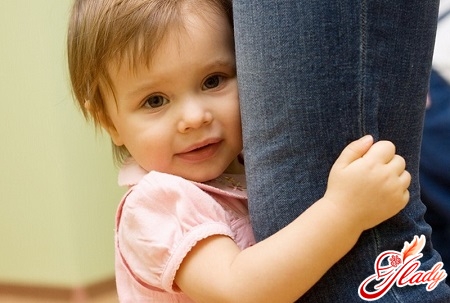
Recommendations on the prevention of childhood fears
- Take care of the child's psychological healthIt is necessary to start even before his birth Child psychologists note an interesting pattern - the calmer the pregnancy was, the less often children subsequently develop any childhood fears. So try, no matter how trivial it may sound, to be less nervous during pregnancy.
- Recommendation for mom:No matter what high position you hold at work, remember that a child is not your subordinate, he does not need a strict leader, but a gentle and loving mother. It has been noted that children of powerful, strict mothers experience fears much more often and in a more severe form. Treatment of childhood fears is very complex and often requires the use of pharmacological drugs.
- Under no circumstances should a child be allowed tofelt abandoned and unnecessary Even if you spend almost all your time at work, or you have a younger child, or for some other reason you have no energy left at all, you must overcome yourself and pay attention to your child. In the absence of adequate treatment for childhood fears caused by a feeling of one's own "uselessness", this problem can lead to the emergence of suicidal tendencies in the child in adolescence.
- However, it is also important to instill in the child a sense of self-worth.Exclusivity is also not worth it. Egoistic thinking also often leads to the emergence of a fear of losing one's exclusive position, which has the character of an obsession.
- Try not to limit the child's communication with peers - this will lead to fears of school life.
- Never compare your child with othersChildren In no case should you give your child the successes that his peers have achieved as an example. This will most likely lead to a decrease in the child's self-esteem.
- Never scare a child with dogs, doctors or police officers. A child takes such threats very seriously.
Speaking about how to overcome fears in children,I would like to note the pleasant fact that, fortunately, almost all of them are temporary and can be easily corrected. However, this requires that parents take this issue very seriously. In the same case, if you cannot cope with childhood fears on your own and you do not know how to deal with their consequences, you can always seek help from a psychologist who will tell you how to get rid of the problem. As a rule, the problem can be eliminated in any, even the most severe and neglected case, but it is advisable not to waste time so as not to traumatize the child's psyche. We recommend reading:





